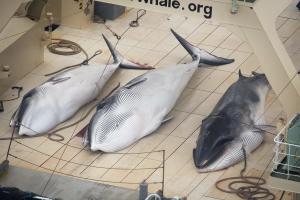#2650 Whaling ban or boon for Japan ? Apr. 20, 2014 [74.高校・大学生のためのJT記事]
時事英語の授業で記事を読み終わった直後の質問ですが、高校生が戸惑っていました。
「簡単そうなんだけど、(適切な)日本語がでてこない・・・」
------------------------------------------------
問題: 新聞の見出しですが和訳してください。
Whaling ban or boon for Japan ?
------------------------------------------------
4月13日のジャパンタイムズ日曜版の1面トップの記事を時事英語の教材に使ったのだが、ジャパンタイムズの記事を検索できない(アップしていない)ので、替わりにヤフーニュースをコピペしておく。
クジラ漁やイルカ漁で日本と米国や西欧と文化摩擦が起きているから、それぞれ英文記事の材料を提供するので高校生や大学生は自分の頭で一度考えてもらいたい。
和歌山県太地町イルカ漁のニュースはジャパンタイムズの2月か3月の日曜版社説がとりあげていたので、時事英語の授業でとりあげている。S朗君に食文化について考えてもらった。Taijiが地名だと気がつかず、「辞書に載っていない」と質問があったので、太地町が和歌山県にあり、入り江の入り口が狭くなっている地形の港町であること、江戸時代にはイルカ漁をしていると解説しておいた。イルカ追い込み漁のやりかたを説明したので、そのあとはスムーズに読めただろう。
驚いたのは哺乳類だから牛やブタと同じように屠場で殺処理すべきだという欧米の獣医や行動科学者の弁である。ずいぶんと手前勝手な意見に聞こえた。
日本の食文化に関する情報の発信の仕方が足りないことは事実のようで、海外で仕事をする人たちは日本の文化と伝統を深く理解し、しっかりした意見を世界の人々に伝えてもらいたい。
(⇒イルカ漁に関するJT紙の2月2日付社説は#2652に転載します。)
日本では、海で獲れるクジラやイルカは哺乳類であっても魚であって動物としては扱われていない。私の記憶ではクジラ肉は魚屋さんで売っていた。団塊世代のebisuが小学生のころだが、お隣の魚屋さんでクジラ肉を売っていた。魚屋でクジラ肉を買う、それが普通の光景だった。根室の肉屋でクジラ肉を扱っていた店を知らない。
いつでも事実と書き手の意見を区別しながら読む癖をつけたらいい。人の意見に左右されずに英文ニュース記事を虚心に読み、そのうえで自分の頭で考えてもらいたい。
見出しを読み、ありありと書いた人のイメージが伝わってくれば「ほぼ読めている」と判断できるから、ヤブーニュースを読んでから、もう一度見出しを眺めて和訳してみたらいい。
国際司法裁判所は科学的な調査捕鯨を禁止したわけではなく、現在の調査捕鯨が科学的な調査の範囲を逸脱していると認定しただけだから、日本は科学的な根拠のある調査捕鯨の具体的なプランを公表して、調査捕鯨を再開することになるのだろう。
それにしても、姑息な「棲息数に関する調査」ではダメだろう、捕獲したクジラは解体処理されて市場へ出回っているのだから。日本人は正面から議論することを避けるが、食文化や伝統工芸品を守るために必要な捕獲頭数を明示して、食文化の観点から捕鯨議論をすべきだ。お互いの相違を認めるところから議論が始まる。
http://news.yahoo.com/un-top-court-rule-japan-whale-hunt-antarctic-014628570.html
==========================
Whaling ban applauded despite fears of Japan sidestep
Sydney (AFP) - Australia and New Zealand on Tuesday applauded a court decision that Japan must halt its annual Antarctic whale hunt, but raised fears it could sidestep the order and begin whaling again under a new "scientific" guise.
The United Nations' Hague-based International Court of Justice (ICJ) ruled on Monday that Japan's whaling programme was a commercial activity disguised as science, and said it must revoke existing whaling licences.
A "deeply disappointed" Tokyo said it would honour the ruling but did not exclude the possibility of future whaling programmes, with New Zealand expressing concerns Japan may try to circumvent the order.
"The ICJ decision sinks a giant harpoon into the legality of Japan's whaling programme," New Zealand Foreign Minister Murray McCully said.
"It still does leave Japan with a decision to make after they've digested this, which is to look at whether they try to devise a new programme that is scientifically based that they could embark upon whaling in the Southern Ocean again.
"Our task is to make sure that we carry out a diplomatic conversation that dissuades them from embarking on that course."
A Japanese minister on Tuesday defended whaling-- seen by some as an important cultural practice -- but stopped short of detailing what next steps Japan would take.
"Whale meat is an important source of food, and the government's position to use it based on scientific facts has not changed," Agriculture, Forestry and Fisheries Minister Yoshimasa Hayashi told a press conference.
"We will scrutinise the verdict and study (measures to be taken) swiftly," he said according to the Jiji news agency. Japan also has a coastal whaling programme which is not covered by the ban.
Australia, backed by New Zealand, hauled Japan before the ICJ in 2010 in a bid to end the annual Southern Ocean hunt.
Tokyo has long been accused of exploiting a legal loophole in the 1986 ban on commercial whaling that allowed the practice to collect scientific data. Japan has killed 10,000 of the giant mammals under the scheme since 1988, Australia has alleged.
International law expert Steven Freeland, from the University of Western Sydney, said Japan could simply redesign its whaling programme to skirt the ruling. He pointed out that the ICJ confirmed scientific research can include killing whales -- just not so many.
"The problem for Japan was its failure to take proper account of non-lethal methods of research or to justify the actual catch numbers it had declared," he said.
"Japan may instead take a very close look at why its implementation of (its research programme) fell foul of its legal obligations and perhaps seek to design and ultimately implement a new whaling programme that takes into account all of those elements."
Japan had argued that its JARPA II research programme was aimed at studying the viability of whale hunting, but the ICJ found it had failed to examine ways of doing the research without killing whales, or at least while killing fewer of them.
Masayuki Komatsu, a former head negotiator for Japan on the whaling issue, said Tokyo had been a victim of its own lax approach over the last decade.
"It became clear in the court procedure and hearings... that Japan was not ambitious enough about its scientific research as it did not catch as many whales as it needed for obtaining data," he said.
"As a result, the entire research whaling programme was judged as a commercial hunt."
A respected blogger and social commentator on Japanese issues, who goes by the name of Hikosaemon, said the narrow issue of whether or not the whaling programme was "science" largely missed the point.
"I think it is clear that both sides here... were seeking moral vindication of their positions," he told AFP.
"Even if it can fix the technical issues with its scientific whaling programme... Japan will need to weigh up whether it is worth the increasing PR damage this issue causes."
The irony, added Hikosaemon, is that the issue of whaling is itself not particularly important for many Japanese.
But efforts "to demonise Japan over this issue have galvanised a siege mentality that has transformed this from an issue about the right to hunt and eat whales, into a more fundamental issue of fair treatment among countries with different cultural values."
Among the 16 judges, 12 -- including ones from Russia and China -- supported the verdict which ordered Japan to stop Antarctic whaling, according to Japanese press reports.
The four judges who opposed it were Japan's Hisashi Owada, and judges from France, Morocco and Somalia. Owada, 81, a former Japanese vice foreign minister and ambassador to the United Nations, is the father of Crown Princess Masako, the wife of Crown Prince Naruhito.
==========================
へえ、ジャパンタイムズの記事には載っていなかったが、国際司法裁判所の16人の裁判官(judges)のうち、日本の調査捕鯨禁止に賛成したのは12人、捕鯨禁止に反対した裁判官4人の内の一人は小和田氏(81歳)、皇太子妃の父親である。いや、ご立派、うれしくなった。
イルカ漁については英国ガーディアン紙の記事のURLを書いておくのでクリックして読んでみてほしい。日本の食文化と欧米の食文化の違いを理解した上で、欧米と戦う論理を組み立ててもらいたい。(この記事はある簡単な操作でコピペ防止措置を外せたので、ワードにコピペして記事を保存した。)
http://www.theguardian.com/world/2014/jan/21/japanese-fishermen-finish-taiji-dolphin-hunt
<解説>
最高裁判決のときに、裁判所から飛び出してきて、あらかじめ用意してあった判決を筆で大書きした紙を広げる光景を何度か見たことがあるだろうか?テレビが走って出てきた人に焦点を合わせる、その瞬間のキモチだと思えばいい。具体的なシーンがイメージできたらOKだ。
「有罪か無罪、どっち?」
単に"A or B"と言っているだけ。
for Japan という前置詞句はboonにかかるだけで、whaling banのほうにはかかっていないことに注意したい。
意味を考えるとすぐに気がつくはずだが、形からは区別がつかない。字面にとらわれているとイメージを受け損なうが、字面から離れすぎても好い加減になる。ほどほどの距離感で書き手のイメージがなんなのかを考えよう。
見出しの文は短いのに限るから、すぐに判断できる句は省略されるのである。省略されたものを補えばよりいっそうハッキリするから、見出しの文を50くらい並べて、片っ端から省略のない文を復元するというトレーニングも面白いかも知れぬ。
アンダーライン部分が省略されたと考えていいだろう。
Which is the judgement, whaling ban or boon for Japan ?
「捕鯨禁止それとも日本に利益、判決はどっち?」
高校生諸君、時事英語は楽しいだろう?![]()
にほんブログ村





コメント 0